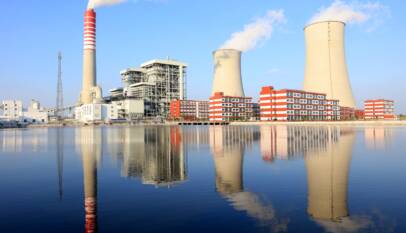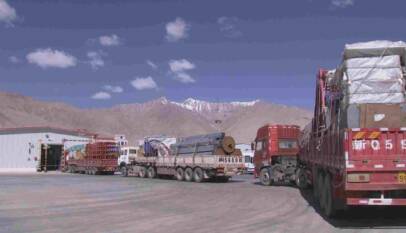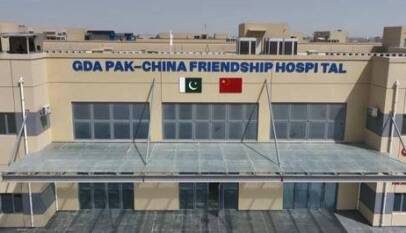Thakot-Raikot upgrading: China, Pakistan all set to ink MoU
Pakistan and China are set to sign an MoU for the upgrade and realignment of the Thakot-Raikot section, a crucial part of the Karakoram Highway under the China-Pakistan Economic Corridor (CPEC). This development comes as caretaker Prime Minister Anwaar-ul-Haq Kakar prepares for his visit to China, signifying a significant step in CPEC projects, especially in the acceleration of the Thakot-Raikot section. This 240-kilometer route is expected to undergo substantial improvements, including state-of-the-art tunnels, reclassification for higher speed limits, and enhanced cargo transport efficiency. The Karakoram Highway serves as a symbol of enduring friendship and cooperation between the two nations, fostering a brighter and more interconnected future.
ISLAMABAD: Pakistan and China are all set to sign a memorandum of understanding (MoU) for the upgradation and new alignment of the Thakot-Raikot section, a critical segment of the Karakoram Highway under the China-Pakistan Economic Corridor (CPEC) framework.
The MoU will be signed during the upcoming visit of caretaker Prime Minister Anwaar-ul-Haq Kakar to China as the stage is set for a significant development in CPEC.
This was confirmed by senior officials of the National Highways Authority (NHA) while talking to Business Recorder. This 240-km long route is expected to be upgraded at a cost of billions of rupees, they added.
The visit promises to be a harbinger of a new era for CPEC projects, particularly in the acceleration of the Thakot-Raikot section.
The Thakot-Raikot section, a critical segment of the Karakoram Highway, is set for a substantial transformation. This route, bridging Thakot and Raikot, plays a pivotal role in the broader KKH and even CPEC infrastructure network, which acts as a vital link between Pakistan and the expanding realm of Chinese trade and commerce.
The Karakoram Highway, known as the Friendship Highway in China, is a testament to the enduring partnership between Pakistan and the People’s Republic of China.
Constructed over a span of 16 years, from 1962 to 1978, it spans a breathtaking 1,300 kilometres, with 806 kilometers of it weaving through Pakistan’s majestic landscapes.
In 2005, Pakistan and China embarked on an ambitious endeavour to upgrade this iconic highway. Phase-I of the Karakoram Highway up gradation, from Raikot to Khunjerab, encompassing a 335 kilometers, reached completion in November 2013, marking a significant milestone in its transformation.
The launch of the CPEC in 2013 ushered in a new vision for the Karakoram Highway. It was no longer just a road; it was poised for a comprehensive makeover.
The goal was to transform it into a world-class thoroughfare, characterised by heightened safety standards, improved road geometry, and an array of modern features.
This rejuvenated KKH brought with it a series of substantial improvements, including tunnels, high-level bridges, stable slopes, and bypasses around congested towns. These changes aligned it with international road standards, offering travellers a safe and remarkable journey through the heart of the mountains, extending from Mansehra to Thakot.
CPEC’s second phase saw the transformation of the E-35 section from Havelian to Thakot, stretching across approximately 120 kilometers. This redevelopment introduced a motorway section that links Havelian to Mansehra, streamlining travel and serving as an emblem of both nations’ commitment to efficient transportation infrastructure.
The consistent development of the Karakoram Highway symbolises the enduring bond between Pakistan and China, epitomising their shared commitment to cooperation, development, and prosperity. This iconic road, a testament to the unwavering friendship between the two nations, opens up new horizons for travellers, cargo transporters, and economic development.
The Thakot-Raikot section is on the brink of a significant change. The existing road, known for its sharp bends and limitations, is poised for an overhaul. State-of-the-art tunnels, aimed at reducing travel time and enhancing safety, are on the horizon.
The road classification will advance from Class 4 to Class 2, signalling an upgrade in its quality and an increase in the permitted speed limit, promising swifter and more efficient travel.
This development extends beyond mere travel enhancements. It holds the potential to revolutionise cargo transport, making it more efficient and cost-effective. The improved road network will support heavier cargo loads, streamlining the transportation of goods with greater ease and efficiency.
As Prime Minister Kakar prepares for his significant visit to China, the Karakoram Highway looms as a prominent highlight of this historic partnership. It signifies more than just a road; it’s a symbol of friendship, cooperation, and a shared vision for a brighter, more interconnected future.
Gwadar Pak-China Friendship Hospital pioneers laser-assisted bladder stone surgery
China-aided Gwadar Pak-China Friendship Hospital has debuted in conducting an operation to…









